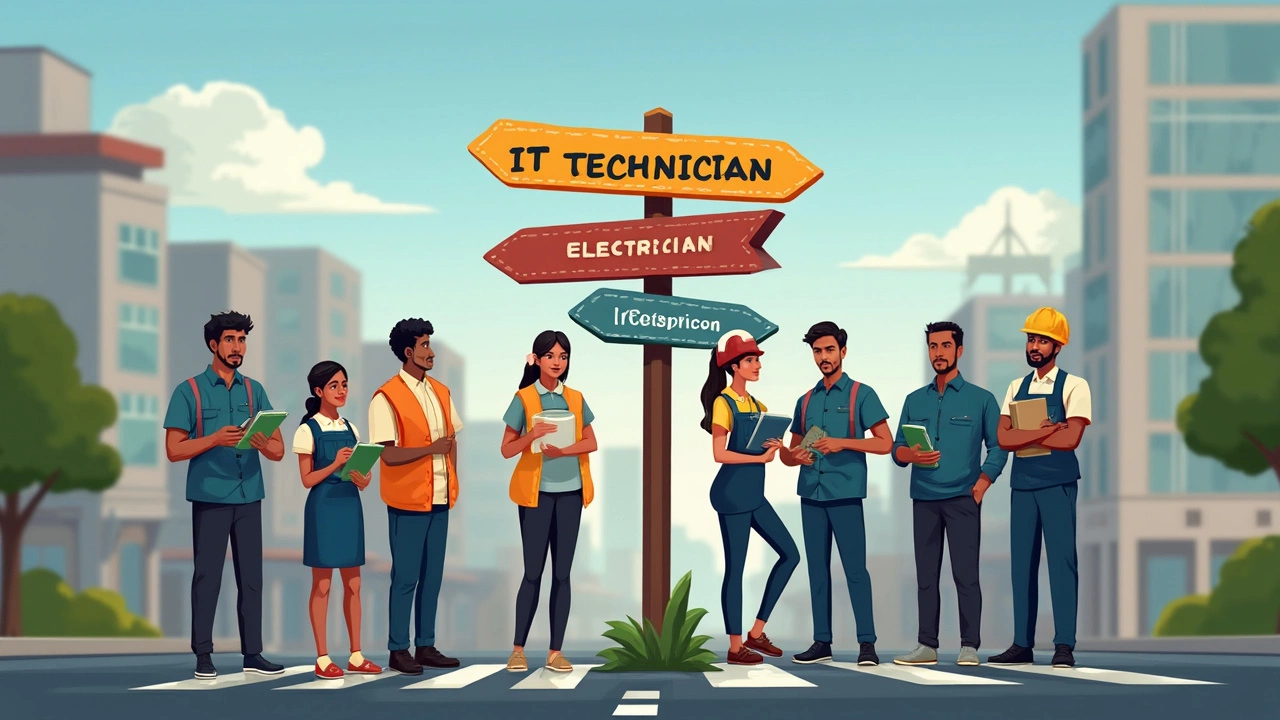Ever wanted a job that actually pays well and doesn't require four years of college? You're not alone. More people are looking at vocational courses because they lead straight to work, usually with skills you can use right away. But with so many options—electrician, healthcare, IT support, culinary arts—how do you know which one is the best?
First thing to know: there isn't a single “best” for everyone. It really comes down to what you want out of work and what kind of lifestyle you imagine. Some careers need steady hands (think electrician or plumber), others need serious people skills (like nursing assistant or digital marketer). The sweet spot is finding a course that lines up with job demand, pays the bills, and fits who you actually are.
A quick tip—look for training that ends in certifications that employers actually care about. Employers notice those, and it saves you the headache of starting over. Grab details about pay, job growth, and what your day will really look like—because no one wants to end up hating their job. Stick around for some surprisingly practical ideas and mistakes to avoid while choosing.
- Best Vocational Courses for a Changing Job Market
- Factors to Consider When Choosing
- Job Prospects & Earning Potential
- Skills You'll Actually Use
- Tips for Picking the Right Course
- FAQs About Vocational Training
Best Vocational Courses for a Changing Job Market
The best vocational courses today aren’t the same ones that worked for past generations. The world’s changing fast: automation, tech jobs, even healthcare look way different than they did a decade ago. So if you want to land in a field that’s actually growing, it helps to look hard at real numbers and real demand.
Healthcare is a winner right now. Courses like medical laboratory technician, radiology technician, and nursing assistant are seeing a steady rise in demand. Hospitals and clinics need more hands-on deck, especially with more people living longer. According to the Indian Ministry of Skill Development and Entrepreneurship, healthcare vocational courses saw a 15% increase in enrollment in 2023 alone.
Then there’s IT support and hardware maintenance. Not everyone wants to be a programmer with a desk job. Short courses in networking, cybersecurity, and hardware repair get you straight into companies craving fresh talent. Vocational training in these tech roles can get you into a starting job in under a year.
Trades still rock for stability and pay. Electricians, plumbers, and HVAC technicians are far from old-school jobs. With more smart homes and advanced appliances, these skills are going through a kind of upgrade. What’s cool is that you learn by doing, not memorizing textbooks.
Want something different? Advanced automobile repair, digital marketing, and graphic design are options you might not expect in the vocational space. The trick is picking a vocational course that leads to actual work—not just nice-sounding certificates.
Check out this handy list of popular courses in today’s market:
- Healthcare Assistant (Multipurpose Worker)
- Medical Lab Technician
- Electrician
- Plumber
- Automobile Technician
- Network & Hardware Support
- Digital Marketing
- Graphic Design
And if you love seeing numbers, here’s how some of these courses stack up for job growth and average starting salaries from 2023:
| Course | Job Growth (Yearly %) | Average Starting Salary (INR) |
|---|---|---|
| Medical Lab Technician | 12% | ₹2,40,000 |
| Electrician | 8% | ₹2,00,000 |
| Network Support | 15% | ₹2,60,000 |
| Digital Marketing | 20% | ₹3,00,000 |
The most important thing? Choose what excites you, matches your strengths, and won’t be swept away by tech changes or economic swings.
Factors to Consider When Choosing
Picking the best vocational course isn't just about what sounds cool or what your neighbor suggests. It's all about what fits your needs—and what will actually lead to a solid job. Here’s what you really need to watch out for when making your choice:
- Job Demand: Check if there's demand for the job in your area or if you’d need to move. For example, electricians and healthcare assistants are in high demand almost everywhere, while some fields may be hit or miss.
- Earning Potential: Some vocational careers pay a lot better than others. For example, skilled welders, licensed electricians, and IT support staff usually start with salaries way above minimum wage.
- Length and Cost of Course: Most vocational training is shorter than college, but check how much time and money it’ll take before you can actually earn. Some courses are a few months, while others (like radiology technician) might be closer to two years.
- Certification and Accreditation: Make sure the course ends with a recognized certificate. If employers don’t respect the qualification, you’ll have to start over.
- Work-Life Balance: Some jobs, like chefs or healthcare aides, often mean weird hours, night shifts, or weekends. If that’s not for you, look at trades with more regular hours.
- Your Strengths and Interests: Are you good with people? Love fixing things? Choose based on what you’re naturally drawn to or what you can see yourself doing every day. No one wants to dread Monday morning.
To give you a clear idea, here's a quick snapshot of how some popular fields compare:
| Vocational Course | Job Growth (2024-2028) | Avg. Starting Salary (USD) |
|---|---|---|
| Electrician | 6% | $48,000 |
| Medical Assistant | 14% | $37,000 |
| IT Support Specialist | 8% | $46,000 |
| Welder | 3% | $40,000 |
Don’t forget to talk to real people working in these fields. They can give you the lowdown on what’s actually good, and what’s just hype. Plus, some certificate programs have job placement help—ask about it. Thinking smart now beats changing careers later.
Job Prospects & Earning Potential
When you start looking at best vocational course options, job prospects and earning potential matter more than anything else. There’s no point training for a job if it’s on the verge of disappearing or pays peanuts. Here’s the basic truth: some vocational fields are booming, while others have hit a dead end.
Healthcare is a real standout. There’s steady demand for nursing assistants, lab technicians, medical coders, and pharmacy technicians—think hospitals, clinics, even home care companies. According to data from IndiaSkills 2024, hospitals hired almost 18% more allied health workers last year than the year before. Annual pay? Most entry-level healthcare vocational roles land between ₹2.5 to ₹4.5 lakhs, and with a couple of years' experience, that can bump up fast.
| Course | Typical Starting Salary (₹/year) | Job Growth |
|---|---|---|
| Electrician | 2.2 - 3.5 lakhs | Consistent |
| Plumber | 2 - 3 lakhs | Steady |
| Medical Lab Technician | 2.7 - 4.5 lakhs | High |
| IT Support | 2.5 - 4.2 lakhs | High |
| Automobile Technician | 2 - 3.5 lakhs | Modernizing |
If you're considering IT support or digital marketing, the numbers are climbing. Not only are these jobs showing up in big tech hubs, but even small businesses want someone with hands-on tech skills. Plus, as you pick up certifications, your earning power climbs. For example, someone with a CompTIA or Google IT certification in India could negotiate a 15-25% higher starting pay compared to those without one.
Don't skip construction trades either. Electricians, fitters, and mechanics might not sound glamorous, but reliable work is a big deal—especially as cities keep growing. And if you get good, side gigs or contract work can double your income in no time.
Here's a quick tip: Always look at where jobs are opening up in your city or region. Sometimes, a course that isn't as hot nationwide is a goldmine right at home. Ask around, check online job boards, and keep an eye out for government skill surveys (the NSDC site is handy for India-specific data).
Bottom line—pick a vocational course where pay matches your life goals and jobs don’t vanish by the time you graduate. If you're aiming for high job security with steady pay hikes, medical lab tech, electrical, or IT support are hard to beat. For steady work that's always needed, plumbing and auto repair can be surprisingly rewarding.

Skills You'll Actually Use
No one wants a best vocational course full of stuff you never touch again. The trick is to zero in on real-world skills—things employers expect you to know on day one. Let's look at some examples across different tracks:
- Healthcare (like medical assistant or nursing support): Expect practical training, like measuring vital signs, handling medical files, doing basic lab work, and communicating with patients. You’ll use those skills every shift. Plus, you’ll get familiar with common medical software, which is huge for job options.
- Electrician or HVAC technician: You’ll get your hands dirty with wiring, reading blueprints, fixing motors, and understanding how to troubleshoot equipment. These are tasks you’ll do almost daily once you’re on a job site. Safety checks and tool handling are drilled into your routine.
- IT Support: From installing networks to fixing computer bugs, you’ll learn practical troubleshooting that small businesses and big companies need. Most courses add in real customer support techniques, which employers love because it saves them time training you later on.
- Culinary courses: Knife skills, basic recipe prep, food safety, and plating—these aren’t just lessons, they’re your whole workday if you end up in a real kitchen. Plus, you’ll learn to handle the heat (literally) and work fast under pressure.
Most vocational training isn’t just bookwork. You’ll get hands-on practice—think real labs, workshops, and even internships. Here’s where you see how theory matches up to the actual job.
Curious which skills are hottest right now? Check out the top three practical skills employers asked for in best vocational course job listings last year:
| Skill | Percentage of Employers Listing It |
|---|---|
| Basic Tech Literacy (using software/tools) | 72% |
| Problem Solving | 63% |
| Teamwork & Communication | 57% |
If you see those in a vocational training outline, you’re probably in good hands. Go for the course where you leave ready to jump in, not just talk about what you learned.
Tips for Picking the Right Course
It can get overwhelming when you’re looking at all the vocational training programs out there. Don't just flip a coin—be smart about it so you don't waste your time or cash. Here’s how you can pick the best vocational course for you that fits both your life and what the job market actually needs.
- Check job demand first: Before you sign up for anything, check job sites for openings in the field. Courses like IT support, healthcare assistant, and skilled trades are always popping up in hiring ads. The Skill India Report 2024 said demand for electricians and healthcare workers grew by 14% over the last year.
- See what pays well in your area: Salaries for vocational jobs can be wildly different depending on where you live. Electricians might earn more in one city, while welders do better in another. Don't just Google average salaries—check local job boards or ask around.
- Go for certification that’s recognized: Employers look for known certificates like ITI for trades, CompTIA for IT support, or Red Cross for healthcare. If your training doesn’t lead to a recognized certificate, it could make finding your first job harder.
- Ask about real practice, not just theory: Doing the job is different from reading about it. Pick courses that offer a lot of hands-on training—like labs, workshops, or internships. That’s where you actually learn what’s needed in the workplace.
- Calculate total cost and time: Some training looks cheap until you find out about exam fees or hidden costs. Double check tuition, supplies, and how long the entire training takes. A shorter but effective course saves you money and gets you earning faster.
- Talk to people actually working in the field: Find someone who’s already doing the job you want. Ask them how they got started, what their day looks like, and if they’d pick the same path again. Real talk beats glossy brochures every time.
Here’s a quick look at how top choices compare on job growth and starting pay in 2024:
| Course | Avg Starting Salary (INR) | Growth Rate (%) |
|---|---|---|
| Electrician (ITI) | 18,000/month | +12 |
| Healthcare Assistant | 16,500/month | +14 |
| IT Support (CompTIA) | 22,000/month | +10 |
| Automotive Services | 17,500/month | +8 |
The best vocational course for you is the one that checks out all these boxes—and fits your own interests and strengths. Trust me, it’s way more fun and profitable when you pick a path that matches what the world needs and what you enjoy doing.
FAQs About Vocational Training
Thinking seriously about a best vocational course? You’re probably not the only one with questions. Here’s what most folks ask—and what matters when you’re picking the right path.
1. Is vocational training as good as a college degree?
For plenty of jobs, vocational training is all you need. Jobs like electrician, automotive tech, and medical assistant actually require hands-on skills, not theory. A report from NSDC India showed that over 70% of fresh vocational grads get placed within six months—just as good, sometimes better, than standard college grads.
2. How long does a typical vocational course take?
Most vocational courses last anywhere from six months to two years. IT diplomas or electrician training? Usually under a year. Nursing assistant or plumbing? Usually around 18 months. You can often work while you finish the course too.
3. Will I find a job straight after finishing?
No guarantees, but chances are way better. Companies need skilled workers who can hit the ground running. Here’s a quick look at job placement rates for popular courses:
| Course | Placement Rate |
|---|---|
| Electrician | 85% |
| Medical Lab Technician | 82% |
| Automobile Mechanic | 78% |
| IT Support | 88% |
IT and healthcare top the list if you’re after job security.
4. Is vocational training expensive?
Usually not. Most vocational training programs are a fraction of the cost of a full degree. Plus, you start earning sooner, making it easier to pay back. Some even offer government-aided seats, so look out for those.
5. Can I switch careers later if I start with vocational training?
Absolutely. Loads of skilled trades let you move up with extra certificates or start your own thing. For example, IT support can lead you into coding or networking, and a course in automotive tech might open doors to running your own garage.
"Vocational skills are not a fallback—they’re a fast track to meaningful, rewarding work." – National Skill Development Corporation (NSDC)
6. Are these courses recognized abroad?
For several skilled trades—like electrician, welder, chef, or medical assistant—yes, they are. Just make sure you ask about international certification options if you want to travel for work.
The main thing? Vocational training is practical, affordable, and targets real jobs. Your effort pays off as long as you choose a skill in demand and don’t fall for outdated programs. Nail that, and you’re way ahead of most job seekers.


